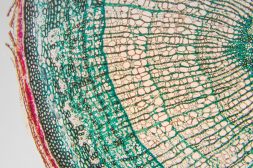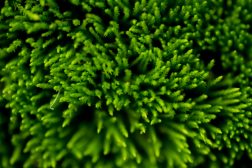Definition
noun, plural: vascular tissues
(botany) A complex permanent tissue involved in the conduction of materials (e.g. water and nutrients) throughout the plant
Supplement
Vascular plants (tracheophytes) have a vascular system that is responsible for the transport of materials throughout the plant. This vascular system is comprised of complex permanent tissues called vascular tissues. There are two major types of vascular tissues: (1) xylem and (2) phloem.
Xylem is the vascular tissue that transports water and nutrients from the roots to the shoots and leaves. It is done through passive transport. In taller plants, the capillary action is coupled by transpiration to enable the transport against the force of gravity. In angiosperms, the xylem is comprised of xylem parenchyma, xylem fiber (or sclerenchyma), tracheids, and xylem vessels. The xylem is the primary component of wood in woody plants. Based on the stage and origin of growth, a xylem may be classified as primary or secondary.
Phloem is the vascular tissue that enables the translocation, i.e. the process of transporting photosynthate materials to all parts of the plant. In angiosperms, the phloem is comprised of sieve elements, companion cells, phloem sclerenchyma, and phloem parenchyma. Similar to xylem, the phloem may be classified as primary or secondary depending on the stage or origin of growth. In woody plants, the phloem is part of the bark.
Synonym(s):
- conducting tissue
See also:






